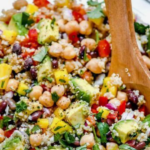Introduction:
In a world where health and wellness are increasingly prioritized, the spotlight has turned to the benefits of a plant-based diet. With a growing body of research supporting its positive impact on well-being, a plant-based diet offers a wealth of advantages for both individuals and the planet. Join us on a deep dive into the world of plant-based eating as we explore its myriad benefits and how it can enhance your overall well-being.
Understanding Plant-Based Eating:
Plant-based eating is more than just a dietary choice; it’s a lifestyle that prioritizes whole, plant-derived foods while minimizing or eliminating animal products. This dietary approach emphasizes fruits, vegetables, legumes, nuts, seeds, and whole grains, providing a rich array of nutrients and antioxidants essential for optimal health.
The Benefits of a Plant-Based Diet:
The advantages of adopting a plant-based diet are numerous and far-reaching. From improved heart health to weight management, here are some of the key benefits:
- Heart Health: Plant-based diets are rich in fiber, antioxidants, and healthy fats, all of which contribute to lower cholesterol levels, reduced blood pressure, and a decreased risk of heart disease.
- Weight Management: Plant-based diets tend to be lower in calories and higher in fiber, making them an effective tool for weight loss and weight management.
- Cancer Prevention: Certain plant foods, such as cruciferous vegetables and berries, contain compounds that have been shown to inhibit cancer cell growth and reduce the risk of certain types of cancer.
- Improved Digestion: The fiber found in plant-based foods promotes healthy digestion and regular bowel movements, reducing the risk of constipation and digestive disorders.
- Enhanced Immunity: Plant-based diets are rich in vitamins, minerals, and antioxidants that support immune function and help protect against infections and disease.
- The Environmental Impact of Plant-Based Eating:
- In addition to its health benefits, plant-based eating also has a positive impact on the environment. Plant-based diets require fewer natural resources, produce fewer greenhouse gas emissions, and require less land and water compared to traditional meat-based diets. By choosing plant-based foods over animal products, individuals can reduce their carbon footprint and contribute to a more sustainable future for the planet.
- Tips for Transitioning to a Plant-Based Diet:
- Transitioning to a plant-based diet can seem daunting at first, but with the right approach, it can be both manageable and enjoyable. Here are some tips to help you get started:
- Start Slow: Begin by gradually incorporating more plant-based foods into your diet, such as fruits, vegetables, legumes, and whole grains.
- Experiment with New Foods: Explore different plant-based ingredients and recipes to discover new flavors and textures.
- Focus on Whole Foods: Prioritize whole, minimally processed plant foods over highly processed alternatives to maximize nutritional benefits.
- Seek Support: Join online communities, attend plant-based cooking classes, or connect with friends and family members who follow a plant-based diet for support and guidance.
- Listen to Your Body: Pay attention to how different foods make you feel and adjust your diet accordingly to meet your individual needs and preferences.
- Incorporating Plant-Based Foods into Your Diet:
- To help you incorporate more plant-based foods into your diet, here are some delicious and nutritious options to try:
- Leafy Greens: Spinach, kale, arugula, and Swiss chard are packed with vitamins, minerals, and antioxidants.
- Legumes: Beans, lentils, and chickpeas are excellent sources of protein, fiber, and essential nutrients.
- Whole Grains: Quinoa, brown rice, barley, and oats provide sustained energy and are rich in fiber and vitamins.
- Nuts and Seeds: Almonds, walnuts, chia seeds, and flaxseeds are nutritious additions to salads, smoothies, and snacks.
- Fruits and Vegetables: Incorporate a variety of colorful fruits and vegetables into your meals to ensure you’re getting a wide range of nutrients and antioxidants.
- Conclusion:
- In conclusion, adopting a plant-based diet offers a multitude of benefits for both personal health and the environment. By prioritizing whole, plant-derived foods and minimizing or eliminating animal products, individuals can improve heart health, support weight management, reduce the risk of chronic disease, and contribute to a more sustainable future for the planet. So why wait? Start incorporating more plant-based foods into your diet today and experience the transformative power of plant-based eating on your overall well-being.
- Quinoa Salad Recipe
 Quinoa salad is a nutritious and versatile dish that combines fluffy quinoa with an array of fresh vegetables, herbs, and a zesty dressing. This colorful salad is packed with protein, fiber, vitamins, and minerals, making it a satisfying and wholesome meal or side dish that’s perfect for any occasion. Origin and Cultural Significance:Quinoa, a nutrient-rich …
Quinoa salad is a nutritious and versatile dish that combines fluffy quinoa with an array of fresh vegetables, herbs, and a zesty dressing. This colorful salad is packed with protein, fiber, vitamins, and minerals, making it a satisfying and wholesome meal or side dish that’s perfect for any occasion. Origin and Cultural Significance:Quinoa, a nutrient-rich … - WellnessPlus: Comprehensive Coverage with Healthy Recipe Benefits
 Introduction:WellnessPlus offers more than just traditional insurance coverage; it provides a holistic solution that integrates comprehensive insurance benefits with healthy recipe benefits. With WellnessPlus, you not only receive essential coverage for your health needs but also gain access to a wealth of resources to support your well-being through nutritious and delicious meals. Comprehensive Coverage:At WellnessPlus, …
Introduction:WellnessPlus offers more than just traditional insurance coverage; it provides a holistic solution that integrates comprehensive insurance benefits with healthy recipe benefits. With WellnessPlus, you not only receive essential coverage for your health needs but also gain access to a wealth of resources to support your well-being through nutritious and delicious meals. Comprehensive Coverage:At WellnessPlus, … - Fit & Flavorful: Insurance That Supports Your Health Journey
 Introduction:Fit & Flavorful isn’t just about insurance; it’s a comprehensive support system designed to enhance your health journey. By integrating insurance coverage with personalized resources, Fit & Flavorful empowers you to prioritize your well-being while enjoying delicious and nutritious meals. Comprehensive Coverage:At Fit & Flavorful, we understand that health is a journey, and our insurance …
Introduction:Fit & Flavorful isn’t just about insurance; it’s a comprehensive support system designed to enhance your health journey. By integrating insurance coverage with personalized resources, Fit & Flavorful empowers you to prioritize your well-being while enjoying delicious and nutritious meals. Comprehensive Coverage:At Fit & Flavorful, we understand that health is a journey, and our insurance … - NutriWise: Smart Coverage for Healthy Living
 Introduction:NutriWise doesn’t just provide standard insurance coverage; it offers a smart solution tailored to support and enhance your journey toward healthy living. By combining comprehensive insurance with personalized resources, NutriWise empowers you to make informed choices and achieve optimal wellness. Comprehensive Coverage:At NutriWise, we understand that health encompasses more than just medical care; it’s about …
Introduction:NutriWise doesn’t just provide standard insurance coverage; it offers a smart solution tailored to support and enhance your journey toward healthy living. By combining comprehensive insurance with personalized resources, NutriWise empowers you to make informed choices and achieve optimal wellness. Comprehensive Coverage:At NutriWise, we understand that health encompasses more than just medical care; it’s about … - VitalityPlus: Insurance and Recipes for a Vibrant Life
 VitalityPlus isn’t just about insurance coverage; it’s a comprehensive solution designed to help you lead a vibrant and healthy life. Our unique approach integrates traditional insurance benefits with personalized recipes and nutritional guidance to support your well-being on all fronts. At VitalityPlus, we understand that true vitality comes from a combination of factors – including …
VitalityPlus isn’t just about insurance coverage; it’s a comprehensive solution designed to help you lead a vibrant and healthy life. Our unique approach integrates traditional insurance benefits with personalized recipes and nutritional guidance to support your well-being on all fronts. At VitalityPlus, we understand that true vitality comes from a combination of factors – including … - RecipeCare: Ensuring Health Through Insurance and Nutrition
 RecipeCare offers a unique approach to healthcare that combines the essential benefits of insurance with personalized nutritional support. Our mission is simple: to ensure your health and well-being through comprehensive coverage and tailored nutrition guidance. At RecipeCare, we understand that true health encompasses more than just medical care – it also involves nourishing your body …
RecipeCare offers a unique approach to healthcare that combines the essential benefits of insurance with personalized nutritional support. Our mission is simple: to ensure your health and well-being through comprehensive coverage and tailored nutrition guidance. At RecipeCare, we understand that true health encompasses more than just medical care – it also involves nourishing your body … - FitGuard: Insurance for a Fit Body and Balanced Diet
 FitGuard isn’t just your typical health insurance – it’s a comprehensive solution tailored to support your journey towards a healthier lifestyle. We understand that achieving optimal health requires more than just medical coverage; it also involves maintaining a fit body and balanced diet. With FitGuard, you receive the essential benefits of traditional insurance along with …
FitGuard isn’t just your typical health insurance – it’s a comprehensive solution tailored to support your journey towards a healthier lifestyle. We understand that achieving optimal health requires more than just medical coverage; it also involves maintaining a fit body and balanced diet. With FitGuard, you receive the essential benefits of traditional insurance along with …
